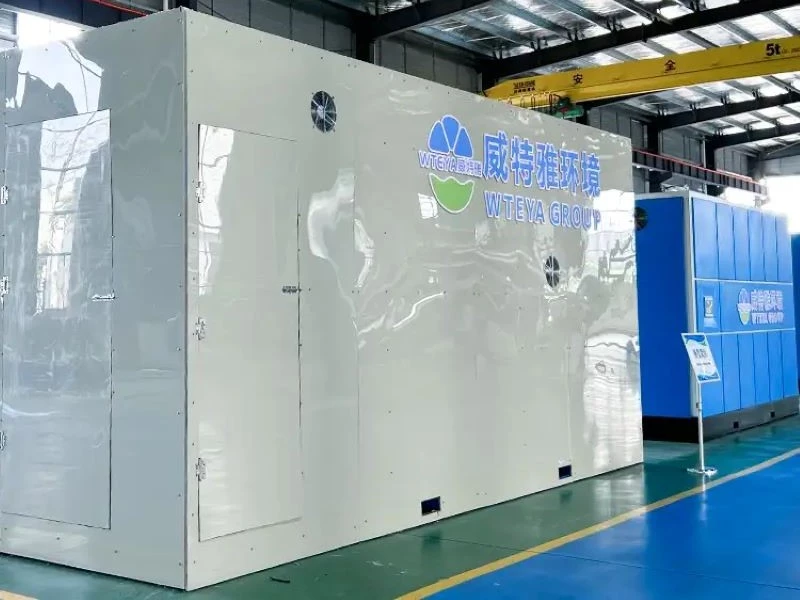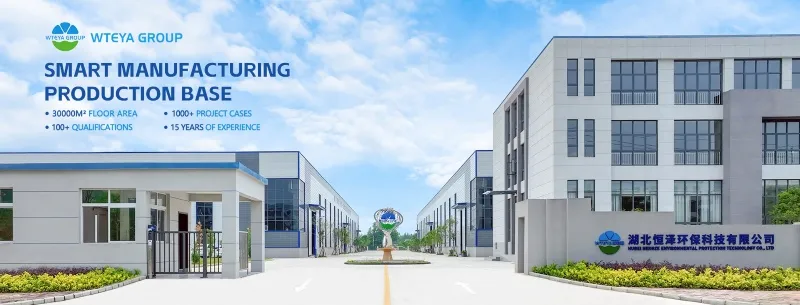The nemesis of refractory organic matter: the outstanding performance of advanced oxidation devices
Refractory organic matter (ROM) presents a significant challenge to wastewater treatment. These are complex compounds that resist degradation by traditional biological and chemical treatment methods. Whether in industrial wastewater, municipal wastewater, or contaminated groundwater, ROM remains in the environment, causing long-term contamination. Fortunately, advanced oxidation processes (AOPs) have emerged as a powerful solution to this long-standing problem. This article explores how AOPs work, their performance in degrading refractory organic matter, and their growing importance in modern wastewater treatment.

What is refractory organic matter?
Refractory organic matter refers to organic pollutants that are chemically stable and difficult to decompose using traditional methods such as biological treatment, such as activated sludge. These compounds often contain complex structures such as aromatic rings, halogenated substances, or synthetic chemicals, which make them resistant to microbial or enzymatic degradation. Common sources of ROM include pharmaceutical waste, industrial chemicals, petrochemicals, and agricultural runoff.
How do advanced oxidation processes (AOPs) work?
AOPs are chemical treatment methods that produce highly reactive hydroxyl radicals (•OH) to oxidize and decompose organic pollutants. These hydroxyl radicals are among the strongest oxidants known, capable of attacking a wide range of chemical bonds in pollutants.
The basic mechanisms of AOP include:
Hydroxy Radical Generation: Hydroxyl radicals are typically generated using processes such as ozone (O₃) generation, hydrogen peroxide (H₂O₂) decomposition, or UV radiation. These radicals break down complex pollutants into simpler, biodegradable species.
Oxidation of Recalcitrant Compounds: Once generated, hydroxyl radicals react with recalcitrant organics, resulting in oxidation. This causes the harmful compounds to break down into smaller, non-toxic species such as carbon dioxide, water, and inorganic ions.
AOP is considered the “gold standard” for treating wastewater containing recalcitrant compounds that have not responded well to conventional methods.
Key AOP Technologies for ROM Degradation
Ozone-Based Oxidation
In the ozone-hydrogen peroxide process, ozone (O₃) is typically used in combination with hydrogen peroxide (H₂O₂) to generate hydroxyl radicals. Ozone reacts with pollutants to generate hydroxyl radicals, which break down recalcitrant organics.
UV/H₂O₂ Process
In the UV/H₂O₂ process, ultraviolet light is used to decompose hydrogen peroxide into hydroxyl radicals, which then decompose the target pollutants. This method is very effective in removing organic chemicals from water.
Fenton's Reagent
Fenton's Reagent is a mixture of hydrogen peroxide and an iron salt (usually ferrous sulfate) that produces hydroxyl radicals under acidic conditions. This process is widely used to treat wastewater containing complex organic pollutants.
Electrochemical Oxidation
In an electrochemical system, an electric current is passed through the wastewater to produce hydroxyl radicals on the electrode surface. This method can be used in both continuous and batch processes to treat difficult-to-degrade organic compounds.
Advantages of Advanced Oxidation Plants
Effective against persistent pollutants
Advanced oxidation plants excel at breaking down organic pollutants that are resistant to biological treatment, including pesticides, pharmaceuticals, and petrochemical residues. This makes them ideal for treating industrial wastewater or wastewater from industries such as pharmaceuticals, petrochemicals, and textiles.
High treatment efficiency
Advanced oxidation processes are able to achieve high removal efficiencies in a short period of time. By oxidizing complex compounds into simpler molecules, advanced oxidation plants ensure that pollutants are completely broken down, reducing the risk of environmental harm.
Minimal sludge production
Unlike traditional biological treatment methods that produce large amounts of sludge, AOPs produce minimal solid waste, making them an environmentally friendly option for treating wastewater.
Application flexibility
AOPs can be used as a stand-alone treatment method or in combination with other methods such as biofiltration, activated carbon, or membrane filtration. This flexibility allows for more targeted solutions based on the specific characteristics of the wastewater.
The role of AOPs in sustainable wastewater treatment
AOPs are playing an increasingly important role in wastewater treatment as concerns about water pollution and environmental sustainability continue to grow. By providing a solution for the degradation of recalcitrant organic matter, AOP helps purify water, providing a reliable, efficient, and environmentally friendly solution for wastewater treatment. As the technology continues to develop, AOP is expected to become even more efficient, playing a central role in ensuring safe and sustainable water management for industries and communities around the world.

Why choose WTEYA Group Advanced Oxidation Plant?
WTEYA Group is a trusted supplier of advanced water treatment solutions, providing one-stop intelligent water treatment equipment to meet the various needs of global enterprises and communities.
More than ten years of rich experience: WTEYA has provided efficient and reliable water treatment solutions to many well-known companies around the world. Successfully implemented projects for listed companies such as Foxconn, Huawei, Ganfeng, Rongbai, etc., with more than 100 project cases, and won the trust and praise of customers.
Tailor-made solutions: customized systems for various water treatment to meet the various needs of enterprises. Support OEM & ODM customization.
Supporting automatic online monitoring system: real-time online monitoring of water treatment effects, abnormal alarm, and predictive maintenance functions to ensure treatment effects.
Contact us now
*Email: info@wteya.com
*WhatsApp: +86-18002840855
If you are looking for reliable, efficient, and customized water treatment solutions, please contact WTEYA Group now. Our team of experts is ready to help you select the advanced oxidation plant that best suits your needs, provide ongoing support, and ensure the highest water quality standards.







